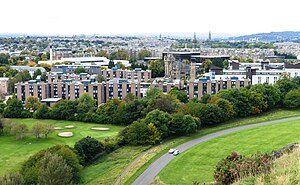
Pollock Halls of Residence is the largest halls of residence for the University of Edinburgh, located in St Leonard's, Edinburgh, Scotland, near the foot of Arthur's Seat. The complex of buildings houses more than 2,000 undergraduate students during term time, and is available to the public as bed and breakfast-style accommodation outside of the teaching term. While some of the buildings date from the 19th century, the majority of Pollock Halls dates from the 1960s and early 2000s. Pollock Halls are located on the edge of Holyrood Park, 1+1⁄4 miles (2.0 km) southeast of the centre of Edinburgh, and 3⁄4 mile (1.2 km) from the university's central area around George Square.
History

The two original buildings on site were St Leonard's Hall and Salisbury Green, which were built in the 19th century. Shortly after World War II, Sir Donald Pollock (Rector of the University from 1939 to 1945) gifted the site to the University of Edinburgh and Pollock Halls of Residence came into being.
In the 1960s, a programme was begun to build more modern halls. The first of these was Holland House, which was designed by Sir William Kininmonth (1904–1988); followed shortly by its sister house, Fraser House. In the early 1990s, Holland House and Fraser House began to be run together, and are simply known these days as Holland House.
In the 1960s six system-built tower blocks were added, named in honour of former University Principals: Baird, Ewing, Lee, Turner, Brewster (since demolished) and Grant. At the same time, a Refectory block was opened. This was later named the John McIntyre Conference Centre after the first Senior Warden of the complex, who also acted for a time as a Principal of the University.
The (at the time) largest hall, Cowan House, was opened in 1973 replacing a hall of the same name which was demolished to make way for the regeneration of George Square. It was demolished in 2001.
A further hall, Masson House, was added in the early 1990s. The original Masson Hall–the university's first 'proper' accommodation for female students–had been next to Cowan in George Square, but this was replaced by a Victorian house on South Lauder Road, which was extended for the purpose in 1966, and later sold.
In 2001 and 2002, Cowan House and Brewster House were demolished to make way for the new Chancellors Court development, which opened in 2003 and is now the largest on the site.
Current houses
These days, the complex houses over 2,000 students on full board. Pollock Halls of Residence are available to members of the public on a bed and breakfast basis during the vacation periods of the University of Edinburgh.
The Houses currently in Pollock Halls are:
Baird House
Baird House is a four-storey tower block which was built in the 1960s. It houses 167 students and one warden. Named after George Husband Baird, Principal of the University from 1793 to 1840.
Chancellor's Court
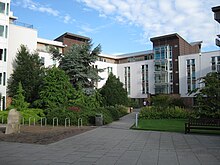
Chancellor's Court was built on the land previously occupied by Cowan House and Brewster House. It was designed by Oberlanders Architects and built by construction company Balfour Beatty. Its construction began in 2001 when Cowan House was demolished, with the first phase opening in 2003. The final phase of the development was completed in 2004. Chancellor's Court has 526 bedrooms and three Wardens flats.
Several protests were held during construction against Balfour Beatty, who were at the time (2001) involved in the controversial Ilisu dam project. One of the protests was led by Mark Thomas, who helped the Edinburgh University People and Planet group organise a 'sit in' where students blocked the entrance to the building site. After these and other protests, Balfour Beatty withdrew their support for the Ilisu dam project. Chancellor's Court is named after the former Chancellor of the University of Edinburgh, the Duke of Edinburgh.
Ewing House
Ewing House is a five-storey tower block which was built in the 1960s. It has 157 rooms. It was named after Sir Alfred James Ewing, Principal of the University of Edinburgh from 1916 to 1929.
Grant House
Grant House is a six-storey tower block, which was opened in 1967, and has been used as a student hall of residence continually ever since. These days it houses 195 students in single study bedrooms. It also contains two flats for the live-in Wardens. It was named after Sir Alexander Grant (1826–1884), Principal of the University from 1868 to 1885.
Holland House

Holland House was opened in 1959, followed shortly after by its sister house, Fraser House (not to be confused with Fraser Court, a block of University flats immediately adjacent to Pollock Halls, which is still in operation). In the early 1990s, Holland House and Fraser House were merged, and are today run as one single house called Holland House, with four blocks (named A up to D). There is also a small annexe which contains two self-catering flats used by postgraduates and mature students. Holland House was named after Sir Thomas Henry Holland, Principal of the University from 1929 to 1944.
Lee House
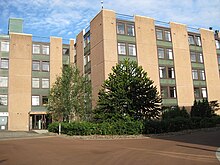
Lee House is a five-storey tower block which was built in the 1960s. It was named after John Lee, Principal of the University from 1840 to 1859. Former British prime minister Gordon Brown spent his first year studying at the university at Lee House.
Masson House
Masson House is a modern four-storey hall of residence, which can hold 133 people in mostly single en-suite double-bedded rooms. It was built in the 1990s and underwent extensive refurbishment in 2016. As of 2021, Masson House is not available as student accommodation, but used as a year-round three-star hotel for business travelers and conference attendees. The university had previously been criticised for its usage of Masson House, given a shortage in student accommodation. It is named after 19th-century historian David Masson, who also lent his name to Masson Hall, the university's first hall of residence for women.
Turner House
Turner House is a seven-storey tower block which was built in the 1960s. It was named after Sir William Turner, Principal of the University from 1903 to 1916. It can hold up to 203 residents, with the majority of rooms being single study rooms, with shared toilets and showers, and two double sized rooms on the 1st and 5th floor for house wardens.
John Burnett House
Having been completed in July 2009, John Burnett House lies on the west side of Pollock Halls, between Lee House and Masson House. The five-storey building can hold 150 students in both single and shared rooms, both of which can have shared or en-suite facilities. It is named after John Burnett, an 18th and early 19th-century judge and legal scholar.
Past Houses
Brewster House
Brewster House was a four-storey tower block which was built in the 1960s and used to house undergraduate students (and tourists during summers) for the length of its use. It was demolished in summer 2002, and the land it stood on was used for the new Chancellors Court building. It was named after Sir David Brewster, Principal of the University from 1859 to 1868.
Cowan House
Cowan House was opened following a £15,000 donation to the University from Thomas Cowan, a retired ship owner in Leith, in recognition of students assistance in the 1926 General Strike. The house originally housed 125 male students in a row of houses on the south side of George Square, where the Main Library now stands. The house was closed and a new house with the same name was built in Pollock Halls in 1973. The new house comprised six three-storey blocks (named A up to F). Undergraduate students were housed in Blocks A, B, C and F with Postgraduates with families being housed in Block D and single Postgraduates in Block E. It was demolished in the summer of 2001 and the land was used for the new Chancellors Court development.
Fraser House
See also Holland House, above. Not to be confused with Fraser Court
The building that used to be called Fraser House still exists, but has been merged with Holland House. Fraser House was named after Sir John Fraser, surgeon and Principal of the University from 1944 to 1948.
Other buildings on site
The other buildings on-site at Pollock Halls are available for use as conference, meeting, dining and function rooms throughout the entire year. Edinburgh First is the commercial arm of the Accommodation Services within the University and is the main point of contact for the hire of these buildings.
John McIntyre Conference Centre
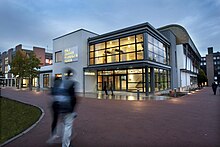
Comprising refectory, shop, and bar upstairs. The bar was previously known as the 'John McIntyre Centre Bar', but was refurbished and rebranded as 'Centro' in 2004. The building underwent an extensive and comprehensive refurbishment in 2009, and was subsequently renamed the John McIntyre Conference Centre, affectionately referred to as the JMCC. It is the university's premier conference center for both academic and non-academic events.
Reception Centre
Opened in 1999, where administrative functions are based. The security team also have their office here.
St Leonard's Hall
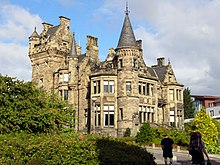
Along with Salisbury Green, St Leonard's Hall is one of the original buildings on the Pollock Halls site. Originally designed by John Lessels for the Thomas Nelson family of publishers, today St Leonard's Hall houses the administrative offices of the university's Accommodation Services, as well as function suites which are used for conferences and other functions.

Salisbury Green
Main article: Salisbury GreenSalisbury Green was one of the two original buildings on site, along with St Leonard's Hall. It was originally built around 1780 by Alexander Scott, and was extended repeatedly.
The building was acquired by the University after World War II and extended again in 1979. In 2006, Salisbury Green was refurbished, and now operates as a hotel. It no longer houses students.
See also
- List of Category A listed buildings in Edinburgh
- List of post-war Category A listed buildings in Scotland
References
- "Pollock Halls". The University of Edinburgh. 25 March 2019. Retrieved 15 August 2021.
- ^ "Edinburgh First for conferences, events and accommodation in Edinburgh". Edinburgh First. Retrieved 5 August 2018.
- "Baird House , Edinburgh". Archived from the original on 31 December 2006. Retrieved 14 October 2006.
- "Balfour Beatty withdraws support for the Ilisu Dam". Archived from the original on 24 September 2008. Retrieved 3 May 2008.
- "Rev. Dr. John Lee from The Gazetteer for Scotland". www.scottish-places.info. Retrieved 17 August 2021.
- "Former PM Gordon Brown reflects on his Edinburgh days". www.edinburghnews.scotsman.com. 13 November 2017. Retrieved 15 August 2021.
- "Refurbishment of Masson House". Edinburgh First.
- "New rector plans action on accommodation". The Student. 31 January 2012. Archived from the original on 15 April 2012. Retrieved 8 August 2012.
- "University defends Masson profits". The Student. 2 April 2012. Archived from the original on 19 April 2012. Retrieved 8 August 2012.
- "John Burnett House, Pollock Halls". Thomson Gray. Retrieved 15 August 2021.
- "A Windfall for Edinburgh". The Glasgow Herald. 25 February 1927. p. 6. Retrieved 3 August 2012.
- JMCC
- "John McIntyre Conference Centre - Edinburgh First".
- Lourie, Emma (10 November 2019). "John McIntyre Conference Centre celebrates a decade in business". The Edinburgh Reporter. Retrieved 15 August 2021.
- "St Leonard's Hall from The Gazetteer for Scotland". Retrieved 5 August 2018.
- "Salisbury Green from The Gazetteer for Scotland". Retrieved 5 August 2018.
| University of Edinburgh | ||
|---|---|---|
| Governance |  | |
| History | ||
| People | ||
| Academic divisions |
| |
| Places |
| |
| Student life | ||
| Associated | ||
55°56′21.65″N 3°10′11.03″W / 55.9393472°N 3.1697306°W / 55.9393472; -3.1697306
Categories: